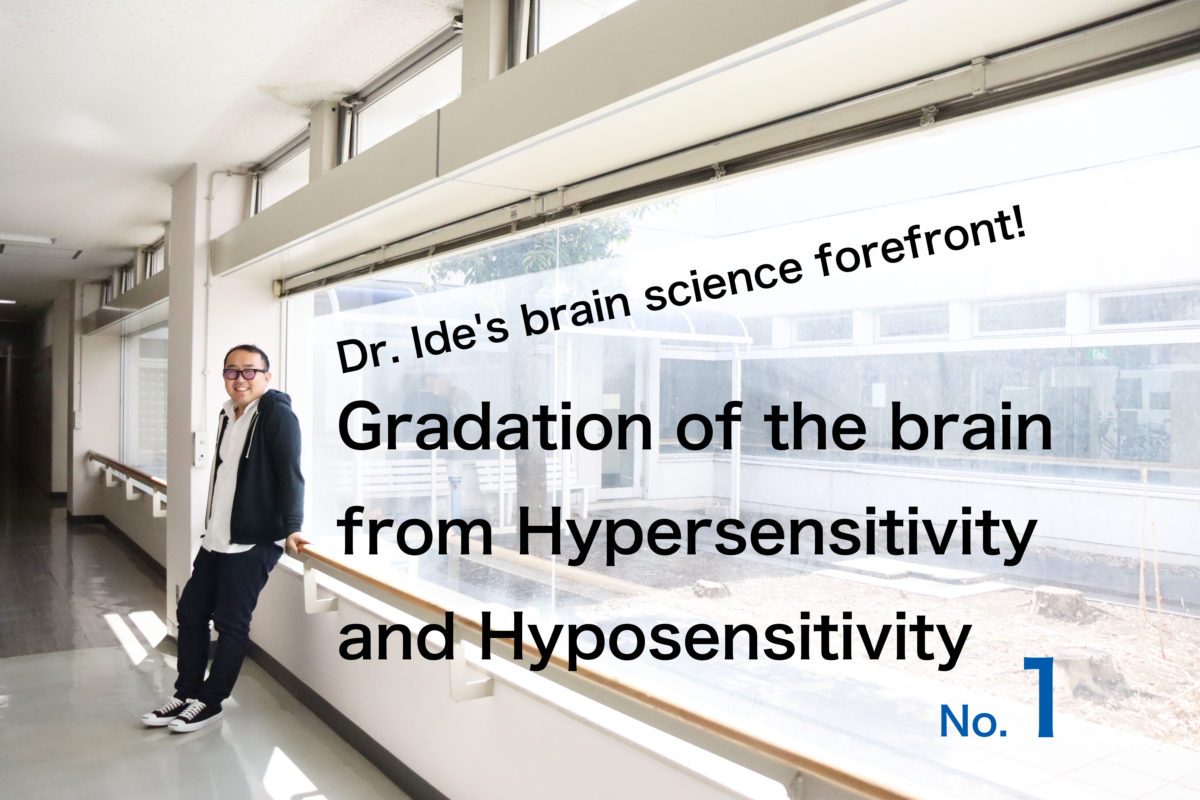Question 1. Dr. Ide, what is hypersensitivity?

Dr. Ide's brain science forefront!
Gradation of the brain from Hypersensitivity and Hyposensitivity
●Read all articles in English
●Read all articles in Japanese
mazecoze:
Dr. Ide, to begin, we would like to ask you about hypersensitivity.
If someone asks you, "What is hypersensitivity?" how do you answer that question?
Dr. Ide:
Simple questions are surprisingly difficult to answer!
I would like to talk about it with simple way so that people in the upper grades of elementary school can read it.
I will give you an example.
It is when you are listening to the principal in the schoolyard.
Other children are fine, but the sun is too bright to stand being there, as it causes headache and feeling sick.
The difficulties and inconveniences caused by unbearable physical reactions are called "hypersensitivity."
Hypersensitivity is a condition in which the person feels very intense or highly sensitive to sensory stimuli.
Hypersensitivity occurs in various senses, which are eyesight, hearing, touch, taste, and smell.
It may also occur with balance sense[1] and thermal nociception.[2]
It was a visual example earlier, but reactions appear in various ways: “I can't concentrate on the class because the voice in the next room bothers me,” “I was touched by my friend all of a sudden and cried,” or “I'm suffering from a smell that others may not notice.” Each person has different reaction.
When we think about hypersensitivity, what I value most is that we do not only look at how the person feels internally, but also how it appears itself as behavior and makes social adjustment difficult for him/her.
So where does the sensory reaction come from?
If you have auditory hypersensitivity, you may think that there is something wrong with the receptor[3] in the ear where you feel the sound.
However, in fact, hypersensitivity is often caused by the difference in how the brain receives sensory stimuli.
The organs that spread throughout the body are called peripheral nerves,[4] which include sensory nerves.
Central nerve[5] is organizing peripheral nerves.
In humans, the central nervous system, where many nerve cells gather, comes roughly from the brain and spinal cord.
Sensory information is sent from peripheral nerves to the central nervous system, and it is speculated that sensory hypersensitivity is resulted from over responsivity of the brain to it.
I'm doing brain science research on hypersensitivity in people with developmental disorder.[6]
This is a study to explore "What's happening in the brain that makes the person hypersensitive?". It was only about 15 years ago that research on hypersensitivity increased in the field of brain science. There are many things I still do not know in the research. But, I would like to share what I discovered through my research in this mazecoze Laboratory articles. I think my answer to the question, “What is hypersensitivity?” is all for now.
mazecoze:
Thank you very much, Dr. Ide!
Hypersensitivity, the reaction that occurs in the body and the connection to the brain. Now we realized how important it is to look at the whole of how reactions appear in actions and lead to difficulties in social life. mazecoze Laboratory would like to know about the hyposensitivity, but next we would like Dr. Ide to tell us about himself.
See you next time!
[1] Balance sense: Sensation of physical changes in body posture and movement
[2] Thermal nociception: Sensation of body in pain, hot, and cold
[3] Receptor: An organ that receives stimuli
[4] Peripheral nerves: a nerve that leaves the central nerve and is divided into organs and tissues throughout the body
[5] Central Nerve: A nerve system consisting of a large group of nerve cells
[6] Developmental disorders: impaired conditions link difficulties of social interactions with other persons that are caused by atypical brain functions
Dr. Masakazu Ide

Research Area : Cognitive Neuroscience, Psychophysics, Neuropsychology.
>web
コンシェルジュ、翻訳家
米国大学にてElementary Educationの学位取得。
外資系ホテルでコンシェルジュを経て、独立。
フリーランスでコンシェルジュ業、翻訳等の仕事をしながら、steam教育、gifted 発達障害等ダイバーシティ勉強中。
→ 「kana」の関連記事を見る